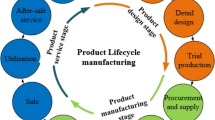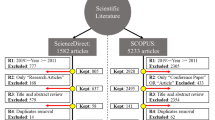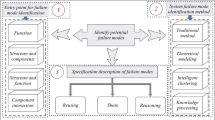Abstract
Scheduling in flexible manufacturing systems (FMS) must take into account the shorter lead time, the multiprocessing environment, and the dynamically changing states. In this paper, a pattern-directed approach is presented which incorporates a nonlinear planning method developed in the artificial intelligence field. The scheduling system described here is knowledge-based and utilizes both forward-and backward-chaining for generating schedules (treated as state-space plans). The pattern-directed approach is dynamically adjustable and thus can handle scheduling requirements unique to the FMS environment, such as dynamic scheduling, failure-recovery scheduling, or prioritized scheduling for meeting deadlines.
Similar content being viewed by others
References
K.R. Baker,Introduction to Sequencing and Scheduling (Wiley, New York, 1974).
D. Bourne and P. Fussell, Designing programming languages for manufacturing cells, The Robotics Institute, CMU-R1-Tr-82-5, Carnegie-Mellon University (1982).
P. Brinkch Hansen,Operating System Principles (Prentice Hall, Englewood Cliffs, New Jersey, 1973).
Y.L. Chang, R.S. Sullivan and U. Bagchi, Experimental investigation of quasi-realtime scheduling in flexible manufacturing systems,Proc. 1st ORSA/TIMS Conf. on FMS, ed. K. Stecke and R. Suri, Ann Arbor, MI (1985).
R.W. Conway, W.L. Maxwell and L.W. Miller,Theory of Scheduling (Addison-Wesley, Mass., 1967).
M. Cutkosky, Precision machining cells within a manufacturing system, The Robotics Institute, Carnegie-Mellon University (1983).
R.E. Fikes and N.J. Nilsson, STRIPS: A new approach to the application of theorem proving to problem solving, Artificial Intelligence 2(1971)189.
R.E. Fikes, P.E. Hart and N.J. Nilsson, Learning and executing generalized robot plans, Artificial Intelligence 3, 4(1972)251.
M.S. Fox, B.P. Allen, S.F. Smith and G.A. Strohm, ISIS: A constraint-directed reasoning approach to job shop scheduling, CMU-R1-Tr-83-8, The Robotics Institute, Carnegie-Mellon University (1983).
M.S. Fox and S.F. Smith, ISIS — A knowledge-based system for factory scheduling, Expert Systems 1, 1(1984)25.
S. French,Sequencing and Scheduling: An Introduction to the Mathematics of the Job-Shop (Wiley, New York, 1982).
G.K. Hutchinson, Flexibility is key to economic feasibility to automating small batch manufacturing, Industrial Engineering (1984) 77.
T. Lozana-Perez, Robot programming, Artificial Intelligence Laboratory, M.I.T., A.I. Memo No. 698 (1982).
M.E. Merchant, Production: A dynamic challenge, IEEE Spectrum (1983) 36.
J.M. Moore and R.C. Wilson, A review of simulation research in job shop scheduling, Production and Inventory Management (1967) 1.
N. Nilsson,Principles of Artificial Intelligence (Tioga, Palo Alto, 1980).
R.M. Rachamadugu, Myopic heuristics in job shop scheduling, Ph.D. Thesis, Carnegie-Mellon University (1982).
E.D. Sacerdoti,A Structure for Plans and Behavior (North-Holland, New York, 1977).
M. Shaw, A two-level approach to scheduling in computer integrated manufacturing,Proc. NBS Symp. on Real Time Optimization in Automated Manufacturing Facilities, ed. R. Jackson and A. Jones, National Bureau of Standards, Gaithersburg, MD (1986).
M. Shaw, Distributed scheduling in computer integrated manufacturing: The use of local area network in cellular systems, Faculty Working Paper No. 1244, Department of Business Administration, University of Illinois (1986).
M. Shaw and A. Whinston, Automatic planning and flexible scheduling, Faculty Working Paper No. 1158, Department of Business Administration, University of Illinois (1985). A condensed version appeared in:Proc. IEEE Conf. on Automation and Robotics, St. Louis, MO (1985).
M. Shaw and A. Whinston, Task bidding, distributed planning, and flexible manufacturing,Proc. IEEE Conf. on AI Applications, Miami, FL (1985).
K.E. Stecke, Formulation and solution of nonlinear integer production planning problems for flexible manufacturing systems, Manage. Sci. 29, 3(1983)273.
A. Tate, Generating project networks,Proc. Int. Joint Conf. on AI, Cambridge, MA (1977).
S. Vere, Planning in time: Windows and durations for activities and goals, Pattern Analysis and Machine Intelligence, Vol. PAMI-5, No. 3 (1983) 246.
D. Wilkens, Parallelism in planning and problem solving: Reasoning about resources, Tech. Note 258, AI Center, SRI (1982).
D.E. Wilkins, Domain independent planning: Representation and plan generation, Artificial Intelligence 22(1984)269.
Author information
Authors and Affiliations
Rights and permissions
About this article
Cite this article
Shaw, M.J. A pattern-directed approach to FMS scheduling. Ann Oper Res 15, 353–376 (1988). https://doi.org/10.1007/BF02186803
Issue Date:
DOI: https://doi.org/10.1007/BF02186803




